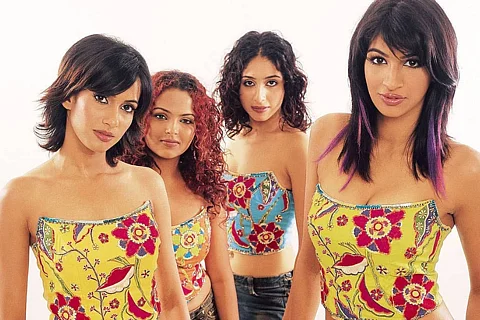
- HOMEGROWN WORLD
- #HGCREATORS
- #HGEXPLORE
- #HGVOICES
- #HGSHOP
- CAREERS
- ABOUT US
- CONTACT US

From The Supremes to the Spice Girls, Destiny’s Child to Twice, pop music wouldn’t be the same without girl groups. They walk the line between cohesion and personal appeal, luring audiences in with rich harmonies and synchronised choreography, and then keeping our attention through each member’s personalities. This push and pull between their individuality and the group’s creative vision, along with their immense talents, beauty, and chic wardrobes, forms the recipe for pop perfection.
When we consider the girl groups that have defined pop music, however, one iconic group is often left out of the conversation. Viva, formed in 2002, broke records as India’s first official girl group. The band came together through a reality show called Coke [V] Popstars, a spinoff of the eponymous British program, Popstars. The show’s producers auditioned women nationwide, searching far and wide for five budding superstars to form a group. After 45 days across six different cities, members Pratichee Mohapatra, Seema Ramchandani, Neha Bhasin, Mahua Kamat, and Anushka Manchanda were recruited, and Viva was born.
Overnight, the girls went from students and regular post-grads to popstar trainees under a camera’s watchful eye. While the episodes of Coke V Popstars season 1 are not available online, news articles from the time detail the meticulous process by which their skills and appearances transformed. As per The Times of India in 2002, by the end of their eight-episode arc, the girls were left with chic new hairstyles, well-developed voices, the trendiest stage outfits — courtesy of Manish Malhotra — and even a record deal.
Their debut album, 'Viva!', was met with an outpouring of love, and, according to The Economic Times, sold over half a million copies. Shortly after its release, Viva embarked on a 5-stop tour across India, breaking records as their first show garnered an audience of over 50,000 people. There was no denying their impact — Viva were overnight sensations; bona fide superstars.
Viva’s music was upbeat and fun, laying their fiery vocals over relatively simple beats in order to let the members shine. Through a modern lens, their music videos are campy and drenched in nostalgia, cutting together scenes of the girls lip-syncing passionately, random dance sequences, and close-ups of their faces, bombastically coated in metallic eyeshadow and frosty nude lips. However, at the time, Viva was not just a breath, but a wave of fresh air in India. From their sound and style to their notable separation from the Bollywood music industry, they proved that Indi-pop had huge potential.
Unfortunately, Viva’s story didn’t end with a happily ever after. The fivesome lost a member, Seema, who left after the release of their first album. After dropping their sophomore album, 'Viva, Reloaded!', in 2003, the group didn’t officially disband, but they did gradually fade away as each member pursued a new solo career. From an outsider’s point of view, their decision not to renew their contract with their record label may have seemed crazy; they were topping the charts, had thousands of fans, and were well on their way to becoming Indi-pop mainstays.
But a look behind the curtain exposes the dark side of the industry that they were plopped into. In a 2017 interview with Filmfare, Viva’s Neha Bhasin recalled the immense pressure she felt to lose weight while in the group, which eventually caused her to develop bulimia. Despite leading the seemingly glamorous life of a pop star, she was depressed and lonely. In another now-archived interview published on Ashish Kate’s blog ten years after their break-up, Neha, Mahua, Pratichee, and Anushka described vicious working conditions, where they were underpaid, creatively controlled, and offered 5,000 rupees for every kilo they lost. These unhealthy, destructive patterns unfortunately follow girl groups across the world.
Although Viva had somewhat of a tragic end, today, the members look back at their time in the band fondly. In 2020, during the height of the pandemic, Neha, Mahua, Pratichee, and Anushka joined forces to remake 'Jago Zara', one of their hits from the early 2000s. This throwback to their work evokes something beyond nostalgia; it serves as a reminder of how ahead of their time Viva was. In terms of both style and sound, Viva was something completely fresh in the Indian market.
Now, over two decades later, there’s finally a new group hoping to fill the Viva-shaped hole in the Indian mainstream. W.i.S.H, who debuted just last year, fill the girl group formula’s quotas of talent, beauty, and style to a T. All they need to thrive and carry the girl group legacy forward is an industry that will accept them for who they are, rather than who they want them to be — the one thing that Viva was tragically deprived of.
If you enjoyed reading this, here’s more from Homegrown:
JK & Tru Skool's Latest EP Bridges East Coast Hip-Hop With Punjabi Cultural Heritage
L-FRESH The Lion, Aywy, & Shitrapper's Latest Cypher Is A Statement Of South Asian Pride
5 Homegrown Artists Dismantling The Boys Club That Is Alternative Music
